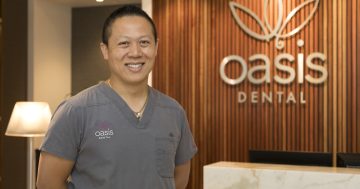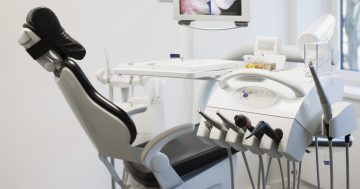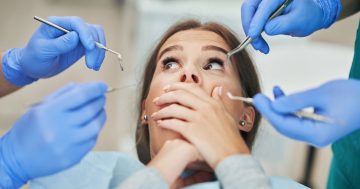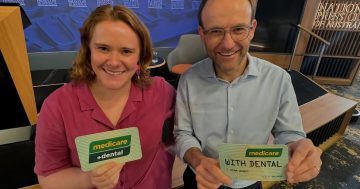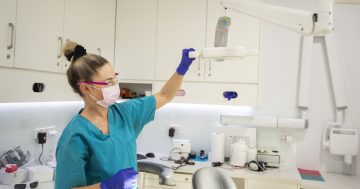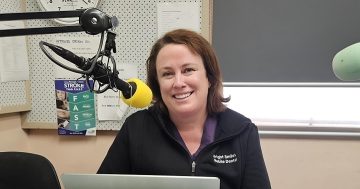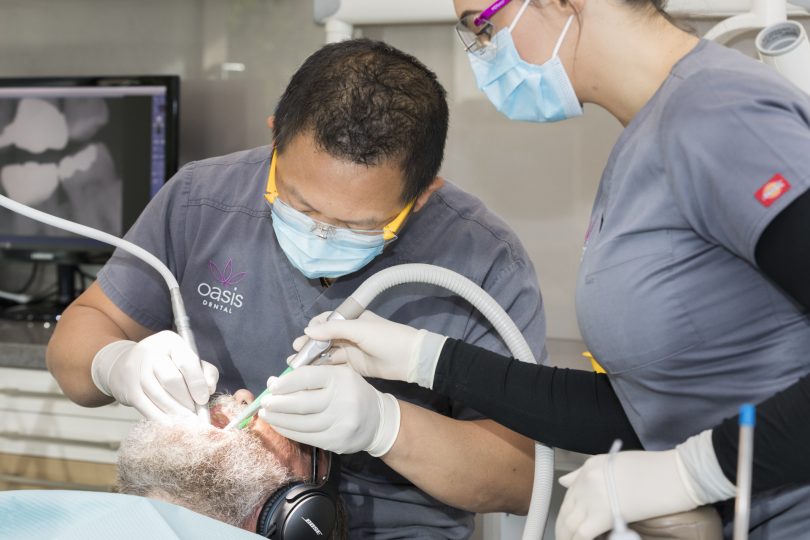
Failed dental implants are on the rise, but not for the reasons you may think. Photo: Michelle Kroll.
Dental implant failures are on the rise, but according to a leading Canberra dentist, it’s not, as many might think, due to a surge in “dental tourism”.
Oasis Dental owner Dr Rick Luu says a rise in implant failure across the world comes down to an increase in the number of clinicians performing the procedure and aggressive price cutting resulting in decreased quality and poorer outcomes.
“People no longer have to fly overseas to go bargain hunting for dental work – there are practices in Australia competing with those prices now,” he says.
Dr Luu focuses on restorative dentistry, performing comprehensive diagnosis and treatment planning restoring teeth as close as possible to their natural state. He says the overwhelming majority of his clinical day is repairing cheap dental work.
“Failed implants are happening more often, and with tragic health costs such as losing jawbone, making it harder to place another implant,” he says.
As a surgical intervention, dental implants come with massive inherent biological risks on several fronts.
For starters, the prosthetic component itself can break.
“The implant alone can cost a dentist as much as $800 or as little as $80, maybe even less depending on the implant’s maker and quality. Reputable implant supply companies that do it well are backed by years of clinical data. They have patents on their designs and have spent millions on them. Cheap companies don’t,” Dr Luu says.
“Good dentists will only use good implants. We’re less concerned about the costs than the poor outcomes and reputational damage of failures.”
Dental implant success is also heavily technique-sensitive, and Dr Luu says not all qualifications reflect that.
Dr Rick only returned to university to complete a graduate diploma in dental implants when the specialist he trusted to refer patients to retired.
But he says legally, you don’t need a university postgraduate course to do the job.
“You only need a certificate, which seems crazy, because dental implants are extremely complicated, and success or failure is a fine line,” he says.
“It’s not a patient’s job to know where they can get good treatment. It’s on the government and regulatory bodies like the Australian Health Practitioner Regulation Agency, the Medical Board of Australia and the Dental Board of Australia, and universities to ensure dentists graduate with a bare minimum competency in the first place.”
Success is case sensitive. A long list of genetic factors such as bone density, health factors such as diabetes, lifestyle factors such as smoking, habits such as bruxism (grinding), any prescription drugs you might take, your soft tissue integrity and overall oral health all impact the likelihood of success.
“There are a lot of people who shouldn’t go down this path, and many aren’t told that. A proper diagnosis should cover whether or not a dental implant is right for you and what the benefits are versus the risks,” Dr Luu says.
“And at the end, even if you manage to get the right components, a great surgeon who does everything right, and the ‘right’ patient, you have still implanted something in the body that is foreign.”
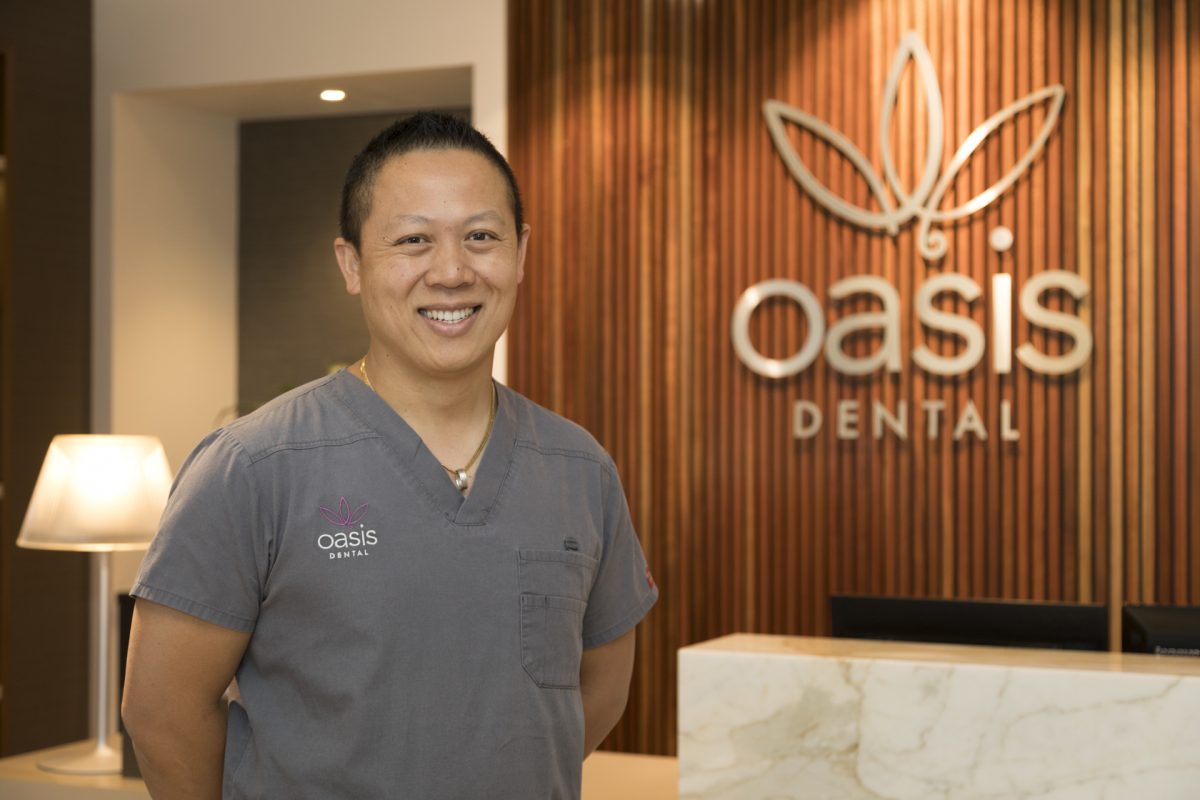
Oasis Dental owner Dr Rick Luu says patients should be armed with all the information, especially the risks of bad outcomes, before undergoing dental implants. Photo: Michelle Kroll.
Dr Luu says the increase in implants is down to a shift in how dentists and patients think – that implants are a viable treatment option for a failing tooth.
“If the tooth is still there, a dentist should do everything they can to save it,” he says. “Implants should only be used as an option to replace an already missing tooth. This should only occur after extracting a completely hopeless failing tooth.”
Perhaps one of the most troubling things is that most failures occur down the track.
While many markers of a failure aren’t instantaneous, catching it in its early stages provides the best chance of salvaging the situation. Pain is a late-stage sign, along with other obvious signs such as loose implants, a bad smell, a bad taste and, perhaps more dramatic – crowns falling off or implants splitting.
As with any dental issue, regular checks are your best preventative course of action.
Dr Luu says when implants fail, patients may find themselves paying double or even triple the original cost, with less guaranteed results.
“Repairing a bad job is always more difficult and thus expensive … You still have to try and achieve a certain outcome but now you’re dealing with a damaged foundation,” he says.
“And aside from the dollar value, there’s the biological cost. What’s the price your body has to pay for that initial and repeated surgery? And consider, if a failed implant takes out the bone entirely, there’s no option to correct the problem.
“Your teeth are connected to your self-esteem, health and wellbeing, your ability to have fun and live life … until you lose that function, the cost is really hard to comprehend.”
For patients who have their hearts set on dental implants, Dr Luu says rather than a case of getting what you paid for, it’s more “you don’t get what you don’t pay for”.
“An old fable goes: the only barber in a small town charges $10 for haircuts. When another barber sets up shop across the road charging $5 a pop, the old barber thinks, ‘It costs me $8 per haircut – I cannot possibly charge $5’. He ponders the problem, and the next day, he sets up a sign out front that reads, ‘We fix $5 haircuts,'” he says.
“If the good barber charges a certain amount, and you don’t want to pay that, you can’t expect a good haircut. Good ain’t cheap and cheap ain’t good.”












